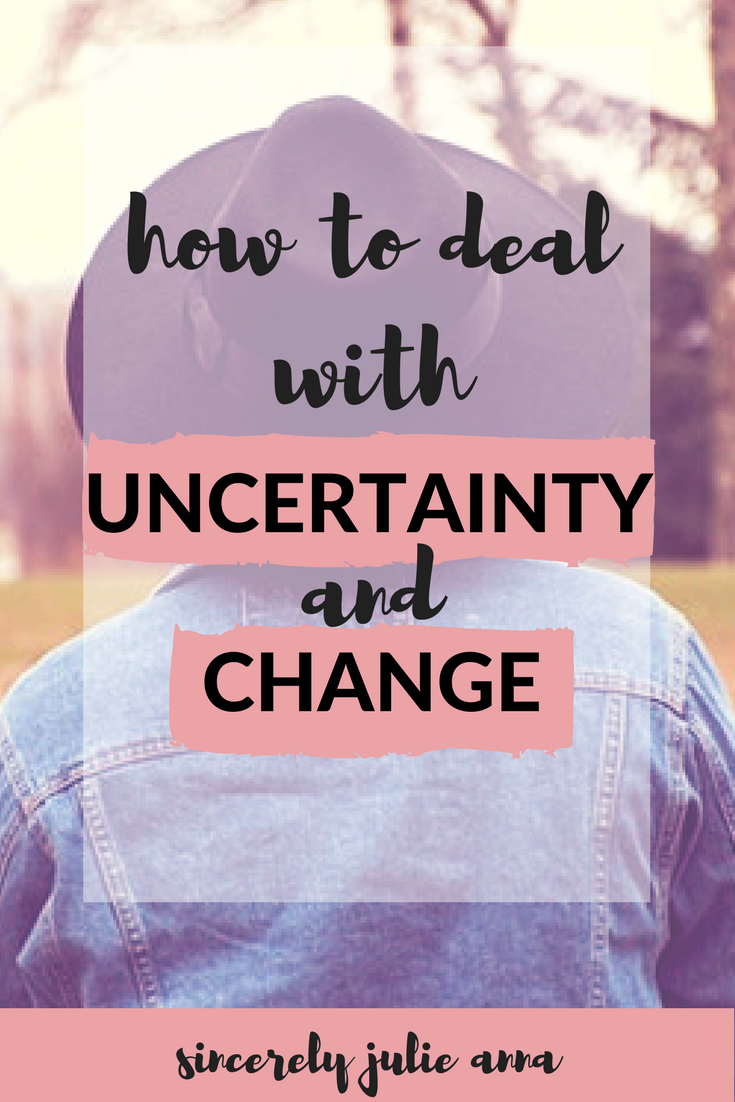
It’s natural for us to want to stay in our comfort zones. However, things change easily, without our say. And if you’re especially the type that needs everything planned out, sudden changes can cause fear, anxiety, irritability, and many more stress-inducing emotions that make you feel trapped and bogged down. Uncertainty is a fact of life – but that doesn’t necessarily make it any easier to deal with. Whether you’re experiencing changes at work, school, in relationships, with your family, and just in life, here’s what you can do to deal with it and make the process of handling changes smoother.
Understand that change is inevitable.
In college, I was a tour guide and diplomat for prospective high school students. Throughout the panels and tours I gave, the most common concern for students was starting anew. Whether that meant just going to a new school, or wanting to leave their home but being held back, many voiced this concern. “I’m scared of change,” many of them said.
For this particular age group, it’s very possible that major life changes haven’t happened yet. They may have stayed in the same town their whole lives, never gone through a family separation, or big financial changes. For many, it’s also the first time on their own. So throughout this time, it’s easy to be uncomfortable with uncertainty and change.
Change is the only thing you can guarantee yourself – and for someone new to this concept, this will be a stressful and uncomfortable thought. As time goes on, and you handle more of these situations, these experiences will help you to expect the unexpected and be prepared.
Two months ago, as I settled into my first full-time job, happier than ever, I found out that my company was sold. I panicked, not fully realizing that this was something I needed to be thinking about. Things are falling into place now, but I now know to expect changes and be prepared for situations like these where I can’t necessarily predict the outcome.
Identify what is bothering you about the situation.
Ever since I read Gretchen Rubin’s The Happiness Project, I’ve stopped to “Identify the problem” for just about everything. Sometimes we feel stressed, but we never stop for a moment and think about the cause of that stress, and how it’s affecting us and the people around us.
Take a moment to really face the uncertainties in your life. Ask yourself a few questions:
- What problem or change is making me feel this way?
- What emotions am I feeling specifically, and why?
- Is there anything I can do in the short-term to ease these emotions?
- What are the realistic outcomes of this situation? Am I prepared to handle that? If not, how can I prepare myself?
- Is there anyone else going through the same thing? Can we garner support from each other?
- Is there anyone with experience in this problem that can help me cope?
Sometimes we want to ignore these situations, but that will often add to the stress we currently face. The quicker you are able to identify the problem and create solutions, the less strain will be put on you – even if this is a situation that will not have a resolution for a while.

Don’t ask the what-ifs, be realistic instead.
When my anxiety gets the best of me, I play what-ifs in my head on repeat. But this only adds to the issue. For me, that’s because those questions, even if they are realistic ones, never get answered. And even then, those what-ifs almost never happen.
Instead of playing these situations, be realistic about what actually could happen. Focus not as much on the question itself, but the answer you have. Each answer should be a set of solutions you are going to have. Especially focus on what you can do now if the what-ifs have a really bad habit of controlling your mind.
For instance, let’s say you just had a really hard midterm, and you won’t be getting the grade back for two weeks. Your grade in the class is okay, but you’re unsure of your performance on the midterm. It’s so easy to say, “What if I failed? What if I have to take the class over? And if it’s only offered in the summer? What if the class isn’t offered again? Then what if I don’t graduate! What if what if what if!”
Notice the mindset pattern on this. The first what-if is the most reasonable, and then it just falls into worse and worse ideas that only serve to add more stress. Let’s try this instead:
“What if I failed? I’ll have to put much more focus and attention into this class and adjust my schedule. I’ll need a few more hours a week and should attend office hours more often.”
That’s a lot more composed, right?
Despite this, it’s going to be difficult to keep the what-ifs down. That’s especially the case in this situation because you’re not getting your grade back for two weeks. Which is why I earlier asked what you can do in the short-term to ease your uncertainty. What can we do here? We can get started on focusing more of our energy on this class since we’ll have a few more grades in the next two weeks. We can also voice our concern during office hours, and ask to go over the test before it’s handed back.
The what-ifs are persistent, but don’t let them get to you. They tend to cause more harm than good.
Understand what kind of opportunities would be lost to your uncertainty.
When I was at the Grace Hopper Conference in 2016 I got to hear IBM CEO Ginny Rometty give her keynote speech on taking risks. She told a story about her early career about a time where she was offered a promotion. Rometty was originally inclined not to take a new position. She didn’t feel she was ready or prepared to handle what the promotion would bring her. But she decided to take the promotion anyway. And then, she said something that’s stuck with me ever since: “Growth and comfort never coexist.”
Our greatest learning experiences often come from times of change, growth, and challenges. This keynote not only changed my perspective on personal and career development but also with my uncertainty in making big decisions and taking calculated risks. When making a decision, it is important to weigh out the pros and cons of each scenario. But if the opportunities behind one of your choices are great, be sure to weigh that factor well in your decision.
Consider whether you had control of the situation.
Are you familiar with the term “locus of control”? It’s how individuals perceive how much of their lives are influenced by them. Someone with an internal locus of control believes more often that they are the cause of everything that happens to them. And someone with an external locus of control believes things are caused by outside forces.
I bring up this topic because, as someone with an internal locus of control, I have a tendency to blame myself for things that aren’t in my control. This adds an extra layer of stress and negative self-talk when it really isn’t necessary. If you think you’ve ever related to this description, consider why your situation happened. If it would have happened anyway, it’s not worth the extra emotional and mental drain.
Even if the situation did occur by your influence, it’s just as important not to fall into negative self-talk. Blaming yourself will still cause just as much strain on yourself that will not lead to a solution. Instead, recognize that what’s done is done, and take it as a learning experience. After all, we learn from our failures, big and small, and that is how we grow. Take the time instead to outline how you will handle the situation, and focus on the present.

Practice meditation and positive affirmations.
In order to truly understand our inner conflict, we must devote our time to it. Whether you use the time to identify the problem or clear your mind, meditation is a wonderful way to handle anxious feelings and stay calm. Your time meditating doesn’t necessarily have to be related to your current situation, either. Try guided meditation if you’re stuck, or create your own routine. Especially in a world where we are constantly bombarded with information and other sources looking for our attention, having this short time undisturbed can do wonders.
Affirmations can also ease the tension you’re currently faced with. Whether you practice them during meditation or while brushing your teeth in the mirror, they can put into words what your want to accomplish and bring on a sense of confidence that you can carry with you throughout the day. Be sure to incorporate both of these into your routine, and give yourself a burst of energy that will help you face what lies ahead.
Remember how you got here.
More than likely, you’ve been in a situation before where you were unsure of the outcome. Even if it was an insignificant situation in your childhood, you’ve had that feeling before. Except the last time you felt it, it probably felt like the end of the world. It was a massive hurdle that you weren’t sure you were going to get over, but you did anyway. And now you’re where you are now. You’ve made it this far. If there’s one thing you can depend on, that’s change. As much as we want things to be constant, we know from experience it won’t be. But one day, you may look at what you’re going through now, and think about it as something you pushed through, and something that made you stronger. So keep going.
Sincerely,
Julie Anna


